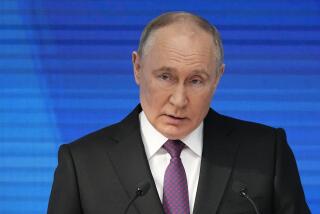Yugoslav Premier Begs West Not to Intervene : Balkans: Panic, stung by lack of outside support in failed bid to oust Milosevic, says any action would be a ‘catastrophe.’
- Share via
BELGRADE, Yugoslavia — As the Western allies continued to consider taking tougher measures against Serbia after the apparent reelection of Serbian President Slobodan Milosevic, opposition candidate Milan Panic made an impassioned plea Tuesday against outside military intervention in the Yugoslav crisis.
“Military intervention in Serbia, and Yugoslavia as a whole, would lead to a catastrophe, not only for the people of my country but also for the whole world,” the Yugoslav prime minister said in a statement. “It would mean that war was declared on my country, the flames of which would ignite and spread through Europe and the world.”
Panic seemed to be embittered by the lack of Western support of his bid to oust Milosevic, who is blamed by most observers as the person most responsible for Serbia’s aggressive policies in Bosnia-Herzegovina.
Panic, a Belgrade-born naturalized U.S. citizen and Orange County pharmaceuticals magnate, campaigned on a pledge to bring peace to Bosnia and return Serbia to the international community.
Despite widespread reports of voting foul play, Milosevic, the nationalist Socialist leader, won popular support for his promise that Serbs will never bend to the will of the West.
Panic complained that Western policy, including a U.N.-imposed trade and oil embargo, had bolstered Milosevic at the polls. Panic said he was speaking in his role as Yugoslav prime minister, not as a Serbian presidential candidate.
“My request for sanctions to be lifted for only 60 days, so that elections could have been held in a better atmosphere without pressure, was not approved,” said Panic, who unsuccessfully lobbied in world capitals for the United Nations to lift the sanctions it imposed on the rump Yugoslavia.
Panic, who insists that he will not leave his native land and will continue in his opposition to Milosevic, has asserted that this week’s Serbian presidential and parliamentary elections were rife with fraud and should be overturned. Foreign observers and Western diplomats have backed opposition claims, saying the elections were riddled with irregularities.
Amid charges of ballot rigging, opposition leaders threatened to boycott the Serbian and federal parliaments after ultranationalists appeared to win an electoral majority. With half the vote counted for the Serbian Parliament, among the results reported by state-run television were: Serbia’s Socialists with 38%, their ultra-right-wing allies, the Serbian Radicals, with 20%; the DEPOS opposition coalition with 17%, and the opposition Democratic Party with just 5%.
Other Yugoslav developments Tuesday included:
* British Prime Minister John Major’s surprise visit to Bosnia. Traveling with a heavily armed convoy into the war-ravaged area, Major played Santa Claus for 2,400 British troops there.
While Major’s main effort was morale-building, his aides said the prime minister also wished to observe conditions on the ground before making a final decision on the nature of any Western military reaction against Serbia--a subject he discussed over the weekend with President Bush.
* Bush’s meeting with the foreign ministers of four central European nations. They called for stronger steps in the effort to halt Serbian aggression.
* A rally at the Holocaust Museum in Washington sponsored by several major Jewish organizations. The groups issued their first major protest of what they said were Serbian atrocities. Citing the lessons they learned from Nazi terrors during World War II, Jewish leaders condemned U.S. leaders and other countries for not taking more forceful action against Serbia.
Times staff writers William Tuohy in London and James Gerstenzang and Matthew Marshall in Washington contributed to this report.
More to Read
Sign up for Essential California
The most important California stories and recommendations in your inbox every morning.
You may occasionally receive promotional content from the Los Angeles Times.













